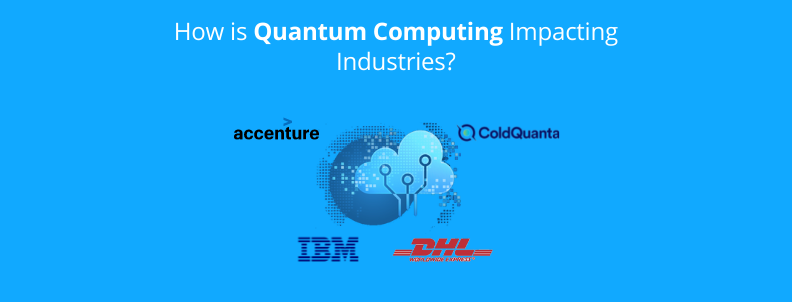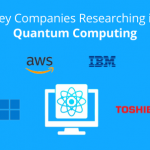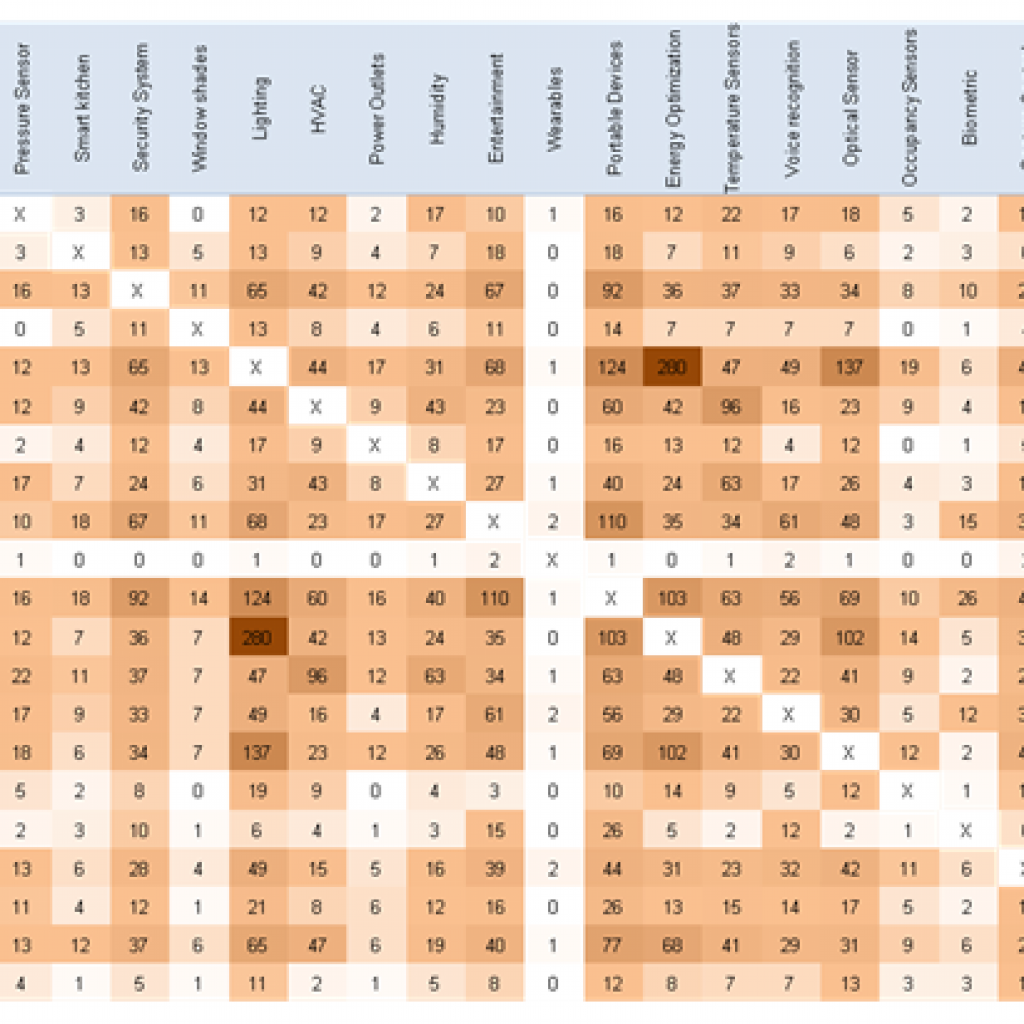This is the second part of our 4 part series on Quantum Computing. The first one discusses the growing market of quantum computing. Considering the growth drivers and opportunities, we can deduce that quantum computing is going to have the same or even more impact than Blockchain. Thus, a number of industries are working on quantum computing to make the best of its benefits that are already known.
By using quantum communication, encrypted messages can be sent faster. Further, applications like superposition and entanglement provide a power that can be advantageous to certain industries to a level that its impact is yet to be measured.
In this part, we will discuss the impact of quantum computing on certain industries. Some of the industries or segments that use quantum computing include:
- Banks and Finance Segment
- Space and Defense
- Healthcare
- Energy and Power
- Chemicals
- Transportation and Logistics
- Government and Academia
Our full report covers research trends of quantum computing, leading companies and prominent startups, top countries where research is being done, and the impact that quantum computing is having on other industries.
Get your hands on a full report and uncover everything about the Quantum computing market and research.
So without further ado, let’s deep dive into the Quantum Computing realm of various industries.
Banks and Finance Segment
Quantum computing has gained popularity in the banking and finance services business, aimed at accelerating trade operations, transactions, and data processing by orders of magnitude. In a data-heavy environment, ever-more-powerful computers are required to effectively calculate probability. With this in mind, some banks are turning to a new breed of computers that use quantum physics principles to crunch massive quantities of data at high speed.
The Commonwealth Bank (CBA) partnered Telstra, the Federal Government, the New South Wales Government, and the University of New South Wales in an $83 million venture to build Australia’s first quantum computing business in August 2017.
Furthermore, NatWest collaborated with Fujitsu on a proof-of-concept study to improve its mix of high-quality liquid assets, such as bonds, cash, and government securities.
In 2019, Google stated that its Sycamore quantum processor took slightly more than 3 minutes to complete a job that would take supercomputer thousands of years to complete. The experiment had limitations, but it did highlight quantum computing’s potential, which is vast in comparison.
Over the next five years, quantum computing will greatly influence the financial services environment. Financial institutions adopting quantum early can gain significant competitive benefits, including the ability to overtake competitors and become market leaders.
Combinatorial optimization capabilities of quantum computing may help investment managers to increase portfolio diversification, adjust portfolio investments to more accurately adapt to market situations and investor goals, and simplify trade settlement procedures more cost-effectively. The commercial value of quantum computing for financial institutions is driven by the following key scenarios:
- Increasing investment returns
- Reduced capital requirements
- Creating new investment options
- Improving risk detection and management, as well as compliance
Financial services activities potentially gaining from quantum computing
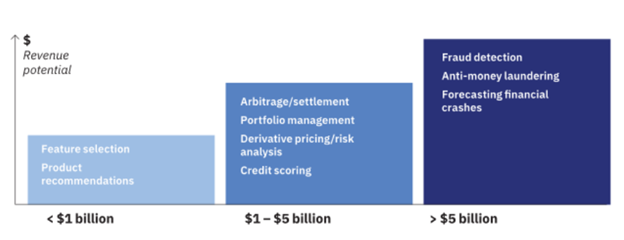
Let’s have a look at how the top players in Banking and Finance are using Quantum Computing.
Top Players in Banks and Finance Segment
JPMorgan Chase
- In 2020, JPMorgan Chase stated that they put Honeywell’s quantum computer through its paces, revealing data last week on one of its quantum-computing tests that may help the financial industry secure accounts and make better investing decisions.
- In 2020, JPMorgan Chase also announced that they are exploring how quantum computing would influence the financial services industry. The company has been a member of the IBM Q Network, Big Blue’s project focused on improving quantum computing, for the past couple of years.
- JPMorgan expressed an interest in creating quantum algorithms for use in artificial intelligence, optimization, and cryptography in job postings released in 2020. It joined with the Chicago Quantum Exchange, a quantum technology hub, in June 2020, and stated that its research team is ‘currently working in the field of post-quantum cryptography.’
Barclays
- In December 2019, Barclays joined the IBM Q Network, a network of Fortune 500 businesses, startups, research laboratories, and universities interested in quantum computing. The membership provided the bank with access to IBM’s quantum processors for experimentation, as well as technical specialists and researchers on quantum computing software from IBM.
- It has been one of the few institutions to explore the potential of quantum computing since 2017. The company’s Chief Technology Officer, in collaboration with IBM, conducted the first successful experiment, which focused on how quantum computing may assist optimize the settlement of batches of securities transactions.
- According to Barclays, they are some way from being able to exploit the full potential of quantum computing, and they anticipate that it will take between 5 and 10 years to be able to use it to solve real-world issues in financial services.
Goldman Sachs
- In 2020, Goldman Sachs assembled an entire team dedicated to quantum computing, according to William Zeng, Goldman Sachs head of quantum research. According to Zheng, Goldman sees three broad applications for quantum computing in finance: simulation (for example, statistical simulations of stochastic processes used in derivative pricing); optimization (for example, portfolio optimization in the context of regulatory and tax constraints); and machine learning, which is still a “nascent” field in finance.
- To evaluate the advantages of quantum computers over traditional computers, IBM and Goldman Sachs researchers collaborated and released a study titled “A Threshold for Quantum Advantage in Derivative Pricing” in 2020. According to the researchers, this is the first thorough assessment of the quantum computing resources designed to accomplish quantum advantage for derivative pricing – one of the most used calculations in finance. Derivatives, according to the authors, are an excellent place to start because of the magnitude of activity around derivatives every year across the world.
- In 2021, Goldman Sachs and QC Ware researchers designed new, robust quantum algorithms that outperform state-of-the-art classical algorithms for Monte Carlo simulations and can be used on near-term quantum hardware expected to be available in 5 to 10 years, marking a significant step forward in the roadmap for quantum advantage for financial applications. Monte Carlo techniques, which are used to assess risk and model prices for a wide range of financial instruments, require complicated computations and take a substantial amount of time and computer resources.
Wells Fargo
- In 2019, IBM announced a multi-year research and learning collaboration with Wells Fargo to improve the bank’s artificial intelligence and quantum computing capabilities. Wells Fargo would join the IBM Q Network and cooperate to improve quantum computing and explore practical applications as part of the deal. IBM would give Wells Fargo access to quantum computing devices at the IBM Quantum Computation Center for commercial use case investigation and basic research. Wells Fargo would also take part in the MIT-IBM Watson AI Lab, working with researchers from MIT and IBM Research to make cutting-edge AI advancements.
The Commonwealth Bank of Australia
- In 2017, Commonwealth Bank partnered with Telstra, the Federal Government, the New South Wales Government, and the University of New South Wales (UNSW) to launch Australia’s first quantum computing firm for $83 million. Silicon Quantum Computing Pty Ltd (SQC) was established to further the development and commercialization of UNSW’s world-leading quantum computing technology. The firm would collaborate with the Australian Research Council (ARC) Centre of Excellence for Quantum Computation and Communication Technology (CQC2T) to operate from new laboratories within CQC2 T’s UNSW headquarters. The Commonwealth Bank has contributed more than $14 million to the creation of the world’s first silicon-based quantum computer.
- In 2020, Rigetti Computing and the Commonwealth Bank of Australia released a new experimental study that would pave the way for practical quantum computing in the financial services industry. QxBranch had been working with CBA for several years before it was bought by Rigetti in July 2019.
NatWest
- NatWest started testing with 1QBit algorithms and the Fujitsu Digital Annealer in 2018 in order to tackle a complicated and computationally expensive challenge that the bank is facing. The company was able to execute an extremely complicated computation that the bank must perform on a regular basis at 300 times the speed of a typical computer, while giving an even higher degree of precision, by using 1QBit software and the Fujitsu Digital Annealer.
Space and Defense
Quantum technology is the application of quantum physics concepts to technological applications. The technology is yet to mature; nonetheless, it has the potential to have enormous consequences for the future of military sensing, encryption, and communications, as well as legislative oversight, authorizations, and budgets.
The Defense Science Body (DSB), an independent board of scientific advisors for the Department of Defense (DOD), has decided that three applications of quantum technology offer the most potential for DOD: quantum sensing, quantum computing, and quantum communications. The DSB determined that quantum radar, which was hypothesized to be capable of detecting object performance parameters (e.g., radar cross-section, speed), was not capable of doing so.
In 2019, Google, in collaboration with NASA and Oak Ridge National Laboratory, demonstrated the power to calculate in seconds what even the most powerful and intelligent supercomputers would take thousands of years to compute, marking a milestone known as quantum supremacy. In 2021, Pentagon official Michael Griffin along with Air Force scientists at Wright Patterson Air Force Base in Ohio explored the future of quantum computing in the US military. Griffin highlighted quantum computers and associated applications as must-do R&D expenditures for the Pentagon.
The technology is being developed for a wide range of civilian uses, and the military sees it as possibly game-changing for information and space warfare. The U.S. Air Force, in particular, is focusing on quantum information science. Some of the most sought features that would be boosted by quantum computing include artificial intelligence algorithms, extremely secure encryption for communications satellites and accurate navigation that does not require GPS signals.
NASA might one day utilize new techniques to help space missions, with quantum optimization making mission schedules more effective and quantum simulation aiding the creation of light and durable materials for new spacecraft, to name a few possibilities. This milestone could be the first step toward that future.
Top Players in Space and Defense
ColdQuanta
- ColdQuanta is a company that commercializes quantum atomics, which it describes as the “next wave of the information era.” The Quantum Core technology of the firm is based on ultra-cold atoms chilled to almost absolute zero, lasers manage and control the atoms with great accuracy. ColdQuanta’s global clients include major commercial and defense enterprises, all US Department of Defense branches, Department of Energy National Labs, NASA, NIST, and major universities.
- ColdQuanta was chosen by the Defense Advanced Research Projects Agency (DARPA) in April 2020 to build a scalable, cold-atom-based quantum computing hardware and software platform capable of demonstrating quantum advantage on real-world challenges.
- In May 2021, ColdQuanta joined The IBM Quantum Network to pursue development opportunities and explore the commercialization of quantum technologies.“Joining the IBM Quantum Network and our integration with Qiskit will enable our commercial and government customers to accelerate their quantum computing initiatives and realize the wide-ranging benefits of quantum.”, Dan Caruso, Executive Chairman of ColdQuanta.
Healthcare
In healthcare, employing quantum computers in conjunction with conventional computers is anticipated to provide significant benefits that classical computing alone cannot provide. As a result, a race to quantum applications has begun.
Quantum computing has the potential to enhance medical image analysis, as well as processing stages like edge detection and image matching. These advancements would vastly improve image-aided diagnostics. For quite some time, medical professionals have predicted the potential benefits of quantum computing in healthcare.
In 2011, Gurudev Dutt and his colleagues from the University of Pittsburgh released a study speculating on what qubit-based systems may offer for radiography. In 2021, Cleveland Clinic and IBM announced a ten-year collaboration with the goal of using the capabilities of quantum computing for next-generation medical research. Cleveland Clinic and IBM have teamed together to establish a new Discovery Accelerator that aims to speed up and widen the range of healthcare and life science research, with the aim of uncovering new approaches to public health issues such as COVID-19.
Quantum computing might allow a variety of innovative use cases for providers and health plans in the healthcare business, such as speeding diagnostics, customized medicine, and optimizing pricing. The sector is particularly interested in quantum-enhanced machine learning techniques.
Quantum computing is expected to have a significant impact on healthcare and since it is in its early stage, most of the early intellectual property in quantum computing may remain proprietary. Thus, highlighting the need of getting started and collaborating with partners and ecosystems as soon as possible. The following are three important possible quantum use cases that are essential to the continuing transformation of the healthcare industry:
- Diagnostic assistance – Early, accurate, and quick diagnosis of patients
- Precision medicine – Keeping individuals healthy through customized interventions/treatments
- Pricing – Reduce insurance premiums and pricing.
In terms of technological adoption, the healthcare industry tends to lag behind other industries. The industry is just now beginning to utilize Artificial Intelligence, lagging behind private-sector advances in this area. As a result, they may be reluctant to adopt quantum, resulting in healthcare lagging behind other industries in terms of innovation.
Top Players in Healthcare Segment
Roche
Alzheimer’s disease has proven to be a notoriously tough disease to solve, but Roche hopes to use a new technology that promises to speed up the process by utilizing a quantum computer. This year (2021), the Swiss drugmaker Roche’s task force plans to investigate the emerging technology’s potential for creating and delivering novel medicinal substances through multi-year cooperation with the United Kingdom’s Cambridge Quantum Computing.
Roche would use CQC’s quantum chemistry software platform EUMEN, which is a set of algorithms designed to model how atoms behave while absorbing energy and will be used to create novel medicines and specialized materials.
“For many years quantum computing has held out great promise for discovering new therapeutics that aid humanity in fighting some of the most devastating and damaging diseases. We are pleased that due to the careful and pioneering efforts of our research teams, some of this promise is starting to come to fruition.”, Ilyas Khan, CEO of Cambridge Quantum Computing.
Boehringer Ingelheim
Boehringer Ingelheim announced a collaboration agreement with Google Quantum AI (Google) on January 11th, 2021, focusing on researching and implementing cutting-edge use cases for quantum computing in pharmaceutical research and development (R&D), specifically including molecular dynamics simulations. The new collaboration combines Boehringer Ingelheim’s industry-leading experience in computer-aided drug design and in silico modeling with Google’s exceptional resources as a leading developer of quantum computers and algorithms.
Boehringer Ingelheim is the world’s first pharmaceutical business to collaborate with Google on quantum computing. The three-year collaboration will be co-led by Boehringer Ingelheim’s newly formed Quantum Lab.
“We are really excited about joining forces with Google, the leading tech company when it comes to quantum computing. Quantum computing has the potential to significantly accelerate and enhance R&D processes in our industry. Quantum computing is still very much an emerging technology. However, we are convinced that this technology could help us to provide even more humans and animals with innovative and groundbreaking medicines in the future.”, Michael Schmelmer, Member of the Board of Managing Directors at Boehringer Ingelheim.
Crown Bioscience
Crown Bioscience (CrownBio), JSR Life Sciences, and Cambridge Quantum Computing (CQC) announced a strategic partnership in February 2021 to explore the use of quantum technology to advance the identification of multi-gene biomarker discoveries for cancer drug discovery. CrownBio’s domain knowledge and huge data set accumulated from 15 years of preclinical and translational research would be combined with CQC’s superior capabilities in quantum algorithms, quantum machine learning, and quantum computing.
“The agreement continues CrownBio’s commitment to innovation and the application of technology to accelerate and de-risk drug development, leading to stronger drug candidates and a more rapid transition from preclinical phases to the clinic.”, Armin Spura, CEO of CrownBio.
Cleveland Clinic
In Mar 2021, Cleveland Clinic and IBM signed a 10-year agreement to establish the Discovery Accelerator, with the goal of fundamentally accelerating the pace of discovery in healthcare and life sciences through the use of IBM’s AI and quantum computing technologies. As part of the agreement, IBM will construct its first private sector, on-premise quantum computing system in the United States at Cleveland Clinic.
The hospital also intends to acquire the first next-generation IBM 1,000+ qubit quantum system in the future years, according to a press statement from the institution.
“We know we’re going to see emerging pathogens, and that there is a large contingent of cancers that are caused by viruses. Our aim is to see these cures come much faster. And to be able to simulate the cure in a computational environment to accelerate the discovery of therapeutics and treatments for these diseases and shorten that time.”, Matthew Kull, CIO of Cleveland Clinic.
Biogen
In 2017, Accenture and quantum software firm 1QBit collaborated with Biogen to develop a first-of-its-kind quantum-enabled molecular comparison application that could significantly improve the advanced molecular design and accelerate drug discovery for complex neurological conditions such as Multiple Sclerosis, Alzheimer’s, Parkinson’s, and Lou Gehrig’s disease. Accenture Labs researchers partnered with 1QBit to develop the new application, which adds quantum capabilities to Biogen’s current molecular comparison technique.
”At Biogen, we’re always looking to harness cutting-edge technologies that push the boundaries of traditional pharmaceutical research to discover new treatments and cures for complex neuroinflammatory and neurodegenerative conditions. Collaborating with researchers at Accenture Labs and 1QBit made it possible to rapidly pilot and deploy a quantum-enabled application that has the potential to enable us to bring medicines to people faster.”, Govinda Bhisetti, Head of Computational Chemistry at Biogen.
Energy and Power
The difficulty of the systems necessary to sustain the world’s energy networks grows in lockstep with the expansion of the world’s energy networks. The growth of distributed energy resources and the emergence of new load classes, such as electric cars, sharply increase the quantities of data required to maintain, analyze, and optimize networks. This expansion also puts additional demand on the existing security and communication infrastructures.
Quantum technology is gaining traction as a major enabler of the future, solving challenging large-grid data optimization issues, providing high-fidelity sensing, and providing fail-safe communication and security. Quantum computers are predicted to help in chemistry and materials research in ways that current supercomputers cannot.
It increases the complexity of cryptographic approaches by employing quantum key distribution and other developing technologies to securely communicate crucial asset control data between nodes. Indeed, when comparing systems on a specific job, quantum technology can deliver considerable energy efficiency benefits due to the reduced time required to solve issues when compared to today’s supercomputers.
In 2019, Microsoft established its quantum network, a collaboration of groups and individuals researching the technology. The Dubai Electricity and Water Authority are one of the members, and it is engaging with Microsoft to research quantum-inspired solutions for energy applications.
Quantum computers, in addition to having the ability to tackle some of the world’s most computationally difficult problems, require much less energy, which might lead to cheaper costs and less reliance on fossil fuels as usage rises. Quantum computing might be utilized in climate modeling to discover prospective wind flow sites, which could aid in the development of new wind-energy sources.
Top Players in Energy and Power Segment
ExxonMobil
In Jan 2019, ExxonMobil and IBM struck a deal to explore next-generation energy and industrial solutions utilizing quantum computing. ExxonMobil became the first energy firm to join the IBM Q Network as part of the deal. ExxonMobil may be able to handle computationally hard challenges across a wide range of applications as quantum computing advances. This included the possibility of optimizing a country’s power system, doing more predictive environmental modeling, and performing extremely precise quantum chemistry simulations to allow the development of novel materials for more effective carbon capture.
”Quantum computing can potentially provide us with capabilities to simulate nature and chemistry that we‘ve never had before. As we continue our own research and development efforts in the areas of energy and chemical manufacturing, our agreement with IBM will allow us to expand our knowledge base and potentially apply new solutions in computing to further advance those efforts.“, Vijay Swarup, Vice President of Research and Development for ExxonMobil Research and Engineering.
Royal Dutch Shell
In May 2020, Royal Dutch Shell collaborated with theoretical physicists and chemists at Leiden University to investigate how quantum computer techniques may aid in the simulation of complicated molecules. Shell’s petroleum retail, chemicals, catalysis, and new energy divisions are all interested in quantum computing. This partnership aided in determining how to use such technology throughout Shell’s companies.
British Petroleum (BP)
In February 2021, BP announced its participation in the IBM Quantum Network with the goal of advancing the use of quantum computing in the energy business. As a result, will have access to IBM’s quantum knowledge and software, as well as cloud-based access to the most powerful quantum computers available. Access to a premium 65-qubit quantum computer, the biggest universal quantum system available to industry today, is included. BP and IBM together will investigate the use of quantum computing to address commercial and technical issues and the potential implications for increasing efficiency and lowering carbon emissions.
BP revealed its net-zero aim and new strategy in 2020. By the end of the decade, it hoped to have produced about 50 giga-tonnes of net renewable generating capacity (a 20-fold increase), boosted annual low-carbon investment by tenfold to around $5 billion, and reduced oil and gas output by 40%.
Chemicals
The chemical sector is positioned to benefit early from quantum computing’s greatly enhanced modeling and computational capabilities. The capabilities of quantum computing allow for a considerable improvement in knowledge of systems governed by quantum mechanics, such as molecular structure and chemical reactions and processes at the heart of the chemical industry’s operations.
The new quantum-computing capabilities bring up the potential of modeling quantum-mechanical systems, such as molecules, polymers, and solids, at a completely different degree of accuracy for the chemical industry. Before manufacturing a single molecule in the lab, it would be possible to determine the most effective molecular designs or structures to complete specified jobs and produce desired effects.
Quantum Computing Leading to Early-Stage Killer Applications Along – The Chemical Industry’s Value Chain
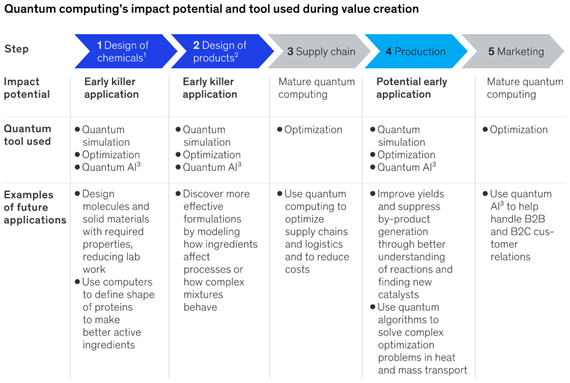
The increased predictive capacity of quantum computing applied to molecular design work might have significant benefits in crop-protection chemicals and many other areas of the specialty-chemicals business, where accurate foresight into the characteristics of novel molecules would accelerate development.
In October 2018, researchers from Cambridge Quantum Computing, in cooperation with a team from JSR Corp, reported that they had “successfully developed state-of-the-art quantum algorithms to calculate the excited states of molecules that take into consideration multi-reference characteristics.”
“Quantum computing opens up groundbreaking new perspectives for our industry. We, therefore, want to invest specifically in the further development of this technology and build up expertise. The partnership with Google gives us the opportunity to do so and is so far unique in the chemical industry.”, Dr. Markus Steilemann, CEO of Covestro.
Chemical firms’ use of quantum computers offers the potential to speed the discovery and development of new chemical systems and materials. Quantum computing has the potential to increase profit margins in the chemical industry by discovering optimal feed-stock routing, refining, and product-to-market combinations.
While other sectors are interested in using Quantum Computing, the advantages for the chemical industry are much simpler to accept since the computing power required for chemical product R&D is considerably lower. Given the importance of research and development of new chemical products, it is fair to assume that quantum computers will play a critical role for the sector’s major players, and will be at the core of R&D in the chemical industry of the future.
Top Players in Chemical Segment
Dow Chemical Company
In 2017, Dow and 1QBit, a Vancouver-based quantum computing software startup, signed a partnership agreement to create quantum computing solutions for the chemicals and materials science technology sectors. The two firms advanced the deployment of quantum computing across a range of applications important to the chemical sector by combining Dow’s unique innovation skills with 1QBit’s experience in the creation of applications for quantum computing. They hoped to establish a strong competence in the quantum computing field with this multi-year arrangement.
Mitsubishi Chemical Corporation
In 2020, Mitsubishi Chemicals, IBM Japan, and a number of other organizations agreed to join the Quantum Innovation Initiative Consortium (QIIC). The primary objective of QIIC is to strategically accelerate quantum computing R&D operations in Japan by bringing together academic talent from across the country’s institutions, major research organizations, and large-scale businesses. These consortium members were also a part of the IBM Q Network, which was created to promote quantum computing and the development of practical applications for it.
In 2021, Mitsubishi Chemical Corporation, JSR Corporation, IBM Japan, and Keio University announced the publication of a paper presenting the study findings of ‘Predicting Optical Properties of OLED Materials on Quantum Computers,’ a collaborative initiative from IBM Quantum Network Hub at Keio University.
Transportation and Logistics
According to DHL’s newest Logistics Trend Radar, quantum computing will be a significant trend in the logistics sector during the next five to ten years. Volkswagen and public transportation operator Carris had collaborated on the world’s first traffic optimization pilot project. The fastest path for each of its nine participant buses over 26 stops was independently computed in near real-time using a quantum computer to assist commuters in avoiding traffic congestion.
Quantum computers will also aid in the development of a more robust supply chain by allowing for adaptive re-planning and asset reallocation in the case of unexpected shutdowns, late shipments, or order cancellations. Quantum computers, with their one-of-a-kind capabilities, are poised to optimize supply chains incorporating a wide variety of intersecting factors.
Everything from life-saving medications and crucial resources to technology, food, and simple consumer items might be transformed as a result. Quantum-powered supply chain optimization algorithms might reduce expensive downtime in the aftermath of natural catastrophes, political conflicts, and other problems by swiftly responding to changing circumstances.
In 2020, SavantX relocated some of its activities to New Mexico where it established a research facility focusing on quantum optimization solutions for industries such as trucking and aviation. SavantX began delivering its Hyper Optimization Nodal Efficiency (HONE) technology to customers such as the Pier 300 container terminal project at the Port of Los Angeles using D-quantum Wave’s services. SavantX, Blume Global, and Fenix Marine Services collaborated on the project, which began in 2019. The project’s objective is to enhance logistics for shipping container spacing and positioning in order to effectively integrate with inbound trucks and freight trains.
Quantum-optimized supply chains should help lower the carbon footprint of whole sectors, which is a widely acknowledged aim. Transportation is responsible for 28% of total greenhouse gas emissions. Simply optimizing routes for US freight trucks by 5% would cut carbon emissions by approximately 22 million tonnes per year. According to Shiraz Sidat, Operations Manager of Speedel, “Quantum computing holds huge potential for the logistics area of the supply chain.”
Quantum computing could transform the logistics industry within the next 5-10 years in the following ways:
- Improve dynamic route optimization.
- Increase concurrent packing of parcels.
- Encourage adaptive asset reallocation.
- Allowing fast testing of designs and materials for logistics applications.
Top Players in Transportation and Logistics Segment
DHL
With the release of its next-generation quantum computer, the System Model H1, in 2020, Honeywell declared a milestone in the early phase of quantum computing. Honeywell revealed the most recent corporate companies to have access to their quantum computer. DHL and Merck are among the companies on the list, as is a cooperation with Accenture. These businesses exhibited a wide range of quantum computing applications, including medicines and logistics.
“Whether it’s dispatching DHL delivery vans or trying to pack a bin so you’re not leaving any air—quantum could drive an efficiency we’ve never seen before.”, Justin Baird, Vice President and Head of Innovation at DHL.
United Parcel Service
United Parcel Service Inc. has introduced Quantum View Manage, an application that enables small package shippers to better manage package movements inside their own supply chains. Shippers can use the Web-based tool to view cargo information for numerous accounts without providing a tracking number. Quantum View Manage had boosted production by 50% to 60%.
Volkswagen
Volkswagen researchers created software on a quantum computer in 2018 that accurately forecasts future traffic levels, transportation demand, and travel time. This aids in avoiding traffic bottlenecks and shortening wait times. The optimization of the automobile fleet, on the other hand, is handled by a quantum chip. The Volkswagen Group is the world’s first automaker to do extensive testing of quantum computers. Volkswagen and D-Wave have been collaborating since 2017 and have previously proven using data from 10,000 public cabs in Beijing that they can utilize a quantum computer to manage traffic flow in the mega-city.
Q-CTRL
An Australian transportation organization has begun laying the groundwork for enhanced commuting with quantum computing in 2021. Its collaboration with the firm Q-CTRL is looking at how quantum computing may someday allow commuters and tourists to move as quickly as possible by utilizing numerous transfers across transit networks.
“Right now, most computations at relevant scale become intractable even for conventional computer models. Our hope is to help usher in adoption of quantum computational approximations delivering quantum advantage so these network optimization problems can be solved on relevant timescales.”, Michael Biercuk, CEO of Q-CTRL.
Conclusion
Quantum Computing is in an evolving phase. Though companies from different industries have started working on quantum computing even they are unaware of applications that quantum computers could provide them. So, it can be concluded that Quantum Computing is in its experimental phase where these companies are doing trial and error runs to see which features of quantum computing can be used.
As more and more progress is made by the researching companies, these industries can take a huge advantage from quantum computing. But the thing is only a handful of companies are actually researching or say building a quantum computer.
In the next part of the study, we shine a light on the companies that are unleashing the power of quantum computing for the above industries.

